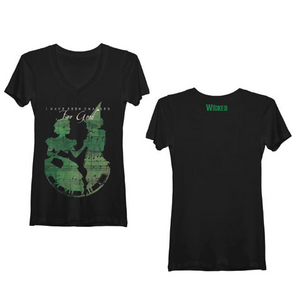GYPSY OF THE MONTH: Rhea Patterson of 'Wicked'

|
|
Since Wicked opened on Broadway five years ago this month, the show has repeatedly broken the record for weekly box office gross; has had three different neighbors—with varying degrees of success—in the adjacent Circle in the Square Theatre; has been produced as far away as Japan and Australia; and has seen its original principals go on to screen roles and Tony recognition. And during those five years Rhea Patterson, who’s currently a member of Wicked’s Broadway cast, danced her first steps—and sang her first notes—in a musical.
Patterson’s career was in modern dance until her former high school classmate Dell Howlett (an alum of Bombay Dreams and Aida on Broadway) persuaded her to audition for a theatrical talent agency a few years ago. Even as a child and teen, Patterson’s performing was devoted almost entirely to dancing. She didn’t take acting classes or do school plays; the closest she ever came to musical theater was show choir—“close,” she says, only because it involved singing and dancing at the same time.
Now she finds herself in the biggest musical of the decade, which celebrates its fifth anniversary on Broadway on October 30 (among the commemorations: a cast album re-release, with bonus CD, and a benefit concert of cut songs). Patterson plays, among other roles, a citizen of Oz, a Shiz University student, an oversize puppet and a flying monkey. Prior to joining Wicked on Broadway in June, she’d been in its Chicago company, and earlier she performed in the 2006-07 national tour of Sweet Charity. In September, she was joined in the Broadway Wicked cast by Patrick McCollum, a swing who’d also been in the Chicago company but before that had performed only in concert dance.
For the first five years following her 2001 graduation from Philadelphia’s University of the Arts, Patterson belonged to the concert dance world. She’s been a member of Urban Bush Women, INSPIRIT, Dayton Contemporary Dance Company and the Bermuda Dance Company. Her first theater audition arose from a concert dance connection. After participating in the choreographer workshops for The Color Purple—the ones that won modern dance maestro Donald Byrd the job of choreographing the show (his first for Broadway)—Patterson auditioned over and over for the Broadway cast. She estimates she was seen close to 10 times, but never got a part. “That’s when I learned how the business works, ’cause I remember the choreographer really liking me and he was like, ‘I’ve done everything I can.’ I just didn’t understand that: ‘Well, if you want me in the show, then what...?’”
Coming from concert dance, where the creative team for any given production tends to be small, Patterson had to sort out the complexities of theatrical production. “Learning that casting agents are different from talent agents—that was a big one for me,” she says. “That there’s all these parties involved in casting: the producers and the directors, and everybody has a say. You don’t realize how big the picture is until you’re actually in a production.”
As soon as Patterson had an agent (the one Howlett had directed her to), she was “sent out to all these auditions I would never had imagined going on.” After eight months of trying to break into musicals, she was cast in Sweet Charity as one of the dance hall hostesses and understudy for lead dancer of “Rich Man’s Frug.” About halfway through the 11-month tour, she began understudying Charity’s pal Helene. “It was perfect timing,” she says, “’cause [by] then I’d really started to understand the curve of the show, how it worked. If I had just walked into it, this being my first show, that would have been way, way over my head.”
In Sweet Charity, Patterson performed beside an actress she’d been watching on screen for years: Molly Ringwald, who played the title role (eventually succeeded by Paige Davis). “Sixteen Candles was one of those movies that whenever it came on, I watched it, no matter how many times I saw it,” says Patterson. “I had expected her [Ringwald] to be this huge personality, but she’s quiet.” She also describes the former teen queen as “a workhorse.”
When Patterson went on as Helene, she got to speak lines of dialogue and sing lyrics solo for the first time on stage. Associate conductor Liz Nantais proved to be an invaluable ally for Patterson as she honed these new job skills. “She took me under her wing and worked with me every week for free, the entire tour,” says Patterson. “She was really my cheerleader, in my corner. And she’s still my vocal coach.”
Charity’s choreographer, Wayne Cilento, and associate choreographer, Corinne McFadden, have also helped further Patterson’s theatrical career, as they hold those same responsibilities on Wicked and hired her for the Chicago company, starting just a week after the Charity tour ended. “Corinne McFadden has been a godsend,” says Patterson. “She was pushing to cast me in Sweet Charity when I was completely new to her. She saw something and trusted me and my work enough to say ‘I’d like to put you in something else.’ I’m forever grateful to her.”
Around the same time she was offered a slot in the New York cast of Wicked, Patterson also got a job offer from La Jolla Playhouse for Memphis, a new Joe DiPietro musical about the birth of rock and roll. She opted for Wicked not just because it would bring her to Broadway but also for the longer-term income, as she’d purchased an apartment in Brooklyn earlier this year.
Home for the first 18 years of her life was Midlothian, Va., near Richmond. A daycare teacher noticed her talent during dance time when she was only 2, and her parents promptly enrolled her in a local studio. A few years later, however, “I distinctly remember not wanting to go to dance class, and wanting to just play in the dirt. I was such a little tomboy!” says Patterson, who’s the middle child between two brothers. “My mother had to drag me [to dance class] for a while—until it got to the recital time and I experienced my first applause. I was like, ‘Oh, yeah, I’m sticking with this!’”
As she was starting high school, Patterson was wooed away to a smaller studio named Ingrid’s Dance Theater, owned by Ingrid Pettus. “She really, really shaped my dancing,” says Patterson. “Without sounding pompous, she enforced [in] me that I was a star. She really pushed me and did a lot of private coaching with me. At my other studio, we did a lot of group competitions and I had never been chosen to do a solo. She gave me not one but three solos. I had never had anybody that invested in me. I had solid teachers before, but they were definitely catering to the group. And she was like, ‘You’re my project.’”
During her high school years, Patterson was at the studio nearly every day and had to quit the track team to leave more time for dance. Yet she squeezed in a few other extracurricular activities: cheerleading and the Latin Club. She also sang in the school choir, but was focused on dance for the future.
“I had selected my college because they had a jazz major in dance,” Patterson says. “I got there and experienced all of the teachers and then decided that I wanted to be a modern major. It was a skill that I didn’t have. What was the point of paying all this money if I was just going to reinforce what I already know?” Just as she’d been doing throughout her childhood, Patterson trained in all types of dance while attending the University of the Arts. Her tap teacher was the legendary hoofer LaVaughn Robinson.
She moved to New York in 2003, to dance with Urban Bush Women. She remains affiliated with them to this day, and is also still a board member of INSPIRIT, another NYC-based troupe with whom she’s performed. Both companies are all-female, and their work is inspired by African and African-American culture, themes and issues. A Village Voice review of a June 2005 Urban Bush Women show at Manhattan’s Joyce Theater said: “In Give Your Hands to Struggle, the gorgeous solo that opens the program, Rhea Patterson’s resilient strength, fluidity, and big, soft jumps embody pride and joy. Her shoulder and torso ripples come from deep inside her body.”
Patterson began helping out in UBW’s office when they weren’t in rehearsal or performance, and was eventually put on staff as an administrative assistant. “I was given more and more responsibilities and found out I liked it. I wanted to be able to do this well.” So, in the summer of 2007, she enrolled in a master’s program in arts administration at Goucher College. She spends two weeks on the Maryland campus every summer and takes courses online the rest of the year, and she should receive her degree in 2010. “I was not interested in stopping performing in order to get a degree,” she explains. “This is the best of both worlds: I’ll have the foundation when I’m ready to stop dancing. I’ll still get to be a part of the arts when my body is done.” She has used Urban Bush Women as a case study for assignments on strategic planning and a marketing audit. “That’s also my contribution to the company—that I am using this new knowledge to figure out how we can improve.”
Compared to dance, theater is “more difficult artistically,” says Patterson, “[because of] finding the newness in doing the same material every day. In concert dance, you get to shuffle around more—repertory switches around and you get to change parts.” Offstage, theater definitely has the advantage. “The schedule is great,” she says. “If you want to train other ways, you have the time, you have the finances, the health insurance—all of those things that keep you living a comfortable life.”
Patterson was surprised to find the life comfortable even on the road. Her dance companies’ out-of-town engagements usually lasted only a few days, at most a couple of weeks, and then she’d be home again. But the Sweet Charity tour was almost a full year away from home. “It was an adjustment, but then I got used to being in a hotel and it was actually kind of comforting,” she says. “To have a limited amount of baggage and that’s all you had to deal with, having someone clean up after you…and having somebody have your back all the time, the company manager. You just kind of felt taken care of. It’s hard to come back to New York and have to carry your laundry up four flights of steps!”
Though Patterson intends to stay in musical theater, she has been working on a new dance piece titled Blood Dazzler, about Hurricane Katrina. Blood Dazzler—named after the Patricia Smith poems on which it’s based (Smith’s book was published last month)—was created by Paloma McGregor, a choreographer for Urban Bush Women and INSPIRIT, and is directed by Paloma’s sister Patricia McGregor. In the piece’s development at Dance Theater Workshop, Patterson has danced the role of Katrina—personified, she says, as “a moving, speaking, living, breathing sort of terrorizing force.” She further describes the character: “Katrina is sort of a diva. They envisioned her as this glamorous woman who has a little delusion: She believes that the destruction she created is really beautiful and people should praise her power.”
Whether dancing or acting, Patterson has always leaned toward art with a social conscience. “I do like work that has weight,” she says. “Wicked has a nice dark side to it that I appreciate. Color Purple is definitely weighty. Memphis is a really rich story that deals with conflict.” Through Urban Bush Women’s extensive community outreach, “I got to do a lot of research, as part of art making, into the political process,” says Patterson, who wears a Peace Love Obama button on her jacket and has been registering people to vote. “Once you know, you can’t pretend you don’t—you’ve got to do something.”
Photos of Rhea, from top: outside the Gershwin Theatre as Wicked's 5th anniversary on Broadway nears; in costume backstage during the Sweet Charity tour; with Gregory Haney in the Chicago production of Wicked; as an Urban Bush Woman (center) with Maria Bauman and Nia Eubanks-Dixon; in Broadway's Wicked, top left, with other Shiz students. [Bottom photo by Joan Marcus.]Videos




